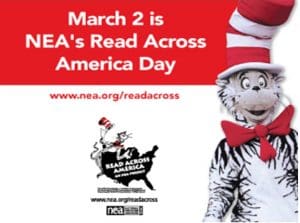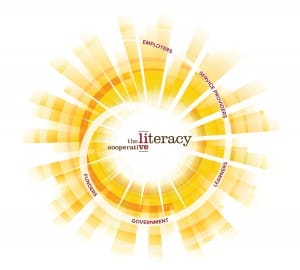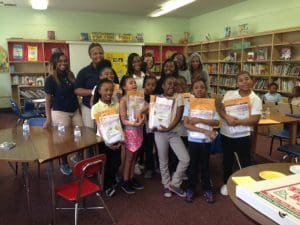Integrating Brain Building into Your Everyday Routine
 Closing the word gap does not require complicated equipment or long hours spent in special classes. There are no PhD degrees needed. It is as simple as talking, singing and reading with your kids every day beginning at birth. Although you may think your baby cannot understand what you are saying, your words help to build and develop their brain. It is as simple as paying attention to the opportunities the day gives you. Your daily routine is full of moments to help build your child’s brain. Many do not realize that it is the short simple moments that can make all the difference.
Closing the word gap does not require complicated equipment or long hours spent in special classes. There are no PhD degrees needed. It is as simple as talking, singing and reading with your kids every day beginning at birth. Although you may think your baby cannot understand what you are saying, your words help to build and develop their brain. It is as simple as paying attention to the opportunities the day gives you. Your daily routine is full of moments to help build your child’s brain. Many do not realize that it is the short simple moments that can make all the difference.
Take a look at the following example of an average daily routine. Does it sound familiar?
Your alarm goes off and you quickly get up and begin to prepare for the day ahead. You shower and get yourself ready before the baby wakes up and the other children get out of bed.
Once you’ve managed to get the kids out of bed, you move to the baby’s room and get them dressed and change their diaper. Once the kids are up and moving you head to the kitchen to prepare breakfast and lunches. As they eat you get the last things you need for your day set. Then it is finding backpacks, homework and shoes and getting into the car. You drive them to school (or summer camp), drop them off and head off for your day with the baby. Whether that is going to work, running errands, doing housework or whatever else your day may consist of that needs to be done before the school day (or summer camp) is over.
The final bell rings and you gather the kids into the car for the drive home with the baby in the backseat. Once home it is time for homework, checking in on the day and preparing dinner. Dinner is eaten and you have a few hours to unwind, maybe you switch on the TV, the baby beside you, in a swing or on a play mat with some toys or the kids go off to their rooms while you relax, before it is time for shower/baths and the bedtime routine. Once the kids are asleep you finish up your night and then head off to bed, ready to do it all again tomorrow.
Do bits and pieces of this sound familiar? Are you reading it over and wondering where the extra time needed to build your child’s brain is? No extra time is needed; it is more about using certain moments differently.
Let’s take another look at that day again. In the morning as your older kids are dressing you are getting the baby ready for the day. This doesn’t need to be a silent endeavor. As you change and dress your baby, talk about what you are dressing them in. “Let’s wear your green duck shirt today!” Or a simple game of peek-a-boo, “Where’s Mommy/Daddy? Here I am!” would be a great way to start the day.
In the morning as the kids are eating breakfast, what else is going on? Is it quiet? Is everyone absorbed in their own tasks? This moment would be the perfect time to hand them a book or read with them as they eat. Doesn’t even have to be a book; could be the back of the cereal box. Many of the boxes have mini-games to play, such as mazes and breaking codes. Sit down with them and do one of the games together. They get to hear new words and use problem solving skills while you get to have some bonding time with them.
Is the baby babbling away in a high chair as they eat breakfast? Make sure to include them in the conversation too! Ask them about what they are eating, “Are those bananas yummy?” If you are reading a story, be sure to share the pictures and colors with the baby as well. Point out an animal and say “Look at the puppy run!”
Are you making lunches as they eat? Why not talk to them about what you are doing? Instead of just chopping up lettuce, carrots and cucumbers for a salad, talk about the shapes you are cutting them into? Are they rectangles? Squares? Triangles? Talk about the color or smell. Ask your kids if they know how and where each vegetable grows.
The time in the car is another great moment to integrate some brain building tasks into your day. Instead of giving them a tablet or turning on a movie to occupy them, try playing a game of I Spy. As your drive point at a street sign and ask about the color or shape. When you stop at a STOP sign, spell the word out or have them point out the letters to you. You can also find some great silly and fun songs to sing together. Silly songs are great for all ages from infants to older children. Infants will benefit from the fun music and can babble along as you sing!
Dinner time presents great opportunities for including more talking, reading and singing into your day. As you cook have your children help. Have them read the recipe with you. Talk about the measurements and the time needed for specific things to cook. You can even put the radio on and sing together as you work.
Helping with dinner doesn’t just have to be something to with only the older children. Make sure to have the baby in a high chair where you can watch them and talk with them as you cook. Narrating what you are doing is great, such as saying “Mommy/Daddy is going to stir the noodles. This is going to be so delicious!”
At the end of the day, instead of turning on the television and watching a rerun you can pull out a board game, build with blocks or color in a coloring book with your child. Those unwind hours can be a great time to do something creative and fun with your child.
For the smaller ones, toddlers and babies, set out a blanket with some interactive toys. (Be sure to limit background noise because too much noise has been shown to inhibit language development.) Let them play and talk with them as they play. Talk about the bunny or puppy stuffed animal they are playing with. If they are playing with a toy piano talk about the sounds it makes and colors on the instrument. Or even pick them up and take them to a window and talk about the stars and animals outside as you bounce them to sleep.
There is no better way to end the day than with a good bedtime story. Read aloud together a favorite book or pick something new. Read with your kids (even the infants) or have them read along with you or for young children, have them tell you the story based off the pictures. Even if your child can read on their own, many still enjoy that time reading together. Pick a longer chapter book and read a chapter a night.
As you can see integrating practices to build your child’s brain into your everyday routine doesn’t take fancy equipment, training or tools. You just need you, your child and a little creativity. Every day occurrences can be ideal times to build skills if you take the time to think about them. Especially for infants and toddlers this is a significant way to help build their skills. Just because they may not understand all the words you are saying does not mean those words aren’t helping their brains to grow.
Summer is in full swing and you most likely have more time with your kids. Prevent “the summer slide,” the phenomenon where kids can lose some of their learning over the summer, by starting to add some of these things to your routine.
Use this time to test ways of integrating more talking, singing and reading into your everyday routine. Find out what works and what doesn’t. Do your kids prefer singing in the car versus the I Spy game? Do they like to help read the recipe instead of talking about the color or shape of foods? Do they have a favorite story that would be good to read during swim breaks?
Summer provides more time for testing some of these ideas. You have more time with your kids outside of school. As you can see these ideas are simple and quick but they can make all the difference.
We are spending the year raising awareness about the 30-million-word gap (learn more here) and what can be done to close it. Join in the discussion and share what you are doing with #wordgapcle on Facebook, Twitter and Instagram.

 Have you ever stopped and thought about how often you speak with your child throughout the day? Do you talk to them in the car about the color of street signs or point out shapes? When you are cooking do you talk about the steps you are taking or what ingredients you are using? Do you ask them questions about what they are playing or about the TV show they are watching or the book they are reading?
Have you ever stopped and thought about how often you speak with your child throughout the day? Do you talk to them in the car about the color of street signs or point out shapes? When you are cooking do you talk about the steps you are taking or what ingredients you are using? Do you ask them questions about what they are playing or about the TV show they are watching or the book they are reading? At The Literacy Cooperative, our mission is to work to advance literacy by raising awareness of the issue, promoting effective public advocacy and fostering a delivery system with maximum impact on the region. This #GivingTuesday we need your help to be able to continue to fulfill our mission.
At The Literacy Cooperative, our mission is to work to advance literacy by raising awareness of the issue, promoting effective public advocacy and fostering a delivery system with maximum impact on the region. This #GivingTuesday we need your help to be able to continue to fulfill our mission. Assure Ready Kids in Cuyahoga County). We are coordinating our community’s Reach Out and Read program to help new parents understand the importance of reading to their children daily and connecting them with infant and toddler programs to help in the learning process. Using an evidence based program, STEP, Supporting Tutors, Engaging Pupils, we trained hundreds of tutors to use structured lesson plans to assist children struggling with reading. We continuously advocate for adult literacy services connected to career pathways to allow low-literate adults to engage in training and employment that leads to family-sustaining wages. That’s why we are leading a partnership with northeast Ohio adult education providers and workforce development agencies to develop and implement contextualized curriculum programs in the Manufacturing, Healthcare, Hospitality and IT sectors. We advocate for the increase of adult and early literacy funding and stronger policies that provide greater opportunities for our low-literate residents to receive support and wrap around services to succeed. We partake in days like International Literacy Day and Read Across America day to bring awareness to the importance of literacy. To learn more about our work, be sure to take a look at our
Assure Ready Kids in Cuyahoga County). We are coordinating our community’s Reach Out and Read program to help new parents understand the importance of reading to their children daily and connecting them with infant and toddler programs to help in the learning process. Using an evidence based program, STEP, Supporting Tutors, Engaging Pupils, we trained hundreds of tutors to use structured lesson plans to assist children struggling with reading. We continuously advocate for adult literacy services connected to career pathways to allow low-literate adults to engage in training and employment that leads to family-sustaining wages. That’s why we are leading a partnership with northeast Ohio adult education providers and workforce development agencies to develop and implement contextualized curriculum programs in the Manufacturing, Healthcare, Hospitality and IT sectors. We advocate for the increase of adult and early literacy funding and stronger policies that provide greater opportunities for our low-literate residents to receive support and wrap around services to succeed. We partake in days like International Literacy Day and Read Across America day to bring awareness to the importance of literacy. To learn more about our work, be sure to take a look at our 